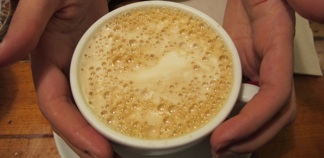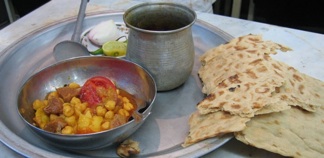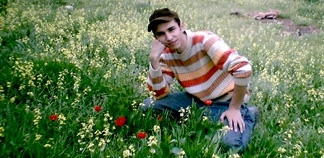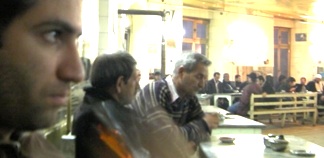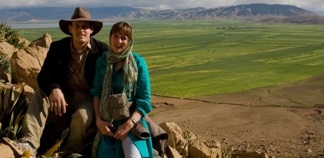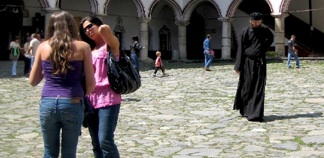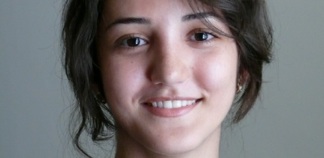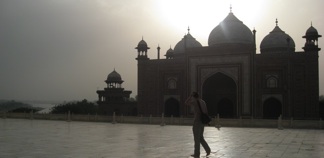به زبان فارسی
PICTORY
LATEST MUSIC
SEARCH
POWER
24-Mar-2010
The taxi ride to my hotel gave me my first look at the dense crowds that Mumbai is famous for. The sky was very dark. The city feared a storm so ferocious that, according to my driver, offices were ordered closed for the next day. A little note on my pillow in the hotel had this from Shakespeare: “A little sleep, per chance a dream.” The view from my window the next morning was like a dream. Several stories below me was the famous Gateway to India
>>>
VISITOR
07-Feb-2010 (6 comments)
I went to Iran, the country of my birth, in November of 2009 and stayed there for two months after being away for 30 years. I had left Iran right before 1979 revolution that overthrew the Shah. Before I left for my visit back to Iran, I was feeling very agitated and depressed about the way things are here in the USA and I felt like I needed to get away for a while. My trip to Iran was a pleasant, interesting, and eye-opening trip, but at times I felt strongly the gloomy atmosphere that was overshadowing the country of my birth>>>
TRAVELER
14-Jan-2010
The narrative of victimhood as a legacy of “colonialism” might feel proprietary to non-Europeans. Bulgarians offer a contrast. The “yoke” Bulgaria complains about is the one imposed by four centuries of Ottoman “oppression,” that separated it from the rest of “Christian Europe.” In this story the Church is the agent of liberation, as a result, ironically, of the distinct religious autonomy allowed to four groups of non-Muslims in the millet (community) system of the Ottoman Theocratic-Imperial rule. Still more paradoxes color the Bulgarian complaint
>>>
FOOD
24-Dec-2009 (3 comments)
My visits to Mumbai, nay India, tend to be centred on visits to Britannia restaurant. (If my plane from Goa arrives later than 2pm, it means waiting until 12 o’clock the next day to eat. It’s well worth not eating for three days in advance in order to stock up like a camel at Britannia.) In fact, those who come to India for spiritual experiences surviving on a plate of dal, prayers, and sweeping an ashram at the crack of dawn baffle me – the closest I have come to a spiritual experience in this great country is the explosion that occurs halfway through a plate of sali boti – diced lamb>>>
TRAVELER
01-Dec-2009
When the Romanian-born Herta Muller won the 2009 Noble prize for literature, her novel The Land of Green Plums shot up to No. 7 on Amazon.com; until then it had been No. 56,359. Muller was little read even in her adopted country Germany, in whose language she writes. Romanians, whose language is different, still take unusual pride in her. This would be a reflection of their craving for positive international recognition, which I observed in my recent trip to Romania. Never mind that like another Noble laureate Elie Weisel, who was Romanian-born, Herta was an émigré from an inhospitable homeland. Romanians, in time, mix history with myth for respectable results. Such is indeed the case with the legacy of another famous writer, Bram Stoker’s legend of Dracula>>>
RECENT COMMENTS
IRANIANS OF THE DAY
| Person | About | Day |
|---|---|---|
| نسرین ستوده: زندانی روز | Dec 04 | |
| Saeed Malekpour: Prisoner of the day | Lawyer says death sentence suspended | Dec 03 |
| Majid Tavakoli: Prisoner of the day | Iterview with mother | Dec 02 |
| احسان نراقی: جامعه شناس و نویسنده ۱۳۰۵-۱۳۹۱ | Dec 02 | |
| Nasrin Sotoudeh: Prisoner of the day | 46 days on hunger strike | Dec 01 |
| Nasrin Sotoudeh: Graffiti | In Barcelona | Nov 30 |
| گوهر عشقی: مادر ستار بهشتی | Nov 30 | |
| Abdollah Momeni: Prisoner of the day | Activist denied leave and family visits for 1.5 years | Nov 30 |
| محمد کلالی: یکی از حمله کنندگان به سفارت ایران در برلین | Nov 29 | |
| Habibollah Golparipour: Prisoner of the day | Kurdish Activist on Death Row | Nov 28 |



